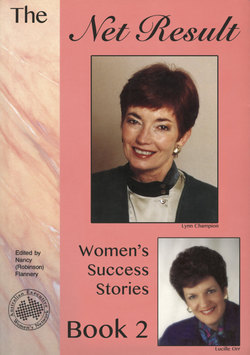Читать книгу The Net Result - Book 2 - Lucille Jr. Orr - Страница 6
На сайте Литреса книга снята с продажи.
Preface
by Nancy Robinson Flannery
ОглавлениеConsultant Editor
Although the series title The Net Result was – and still is – an appropriate one, we could just as well have used the title Celebration, for that is also intrinsic in the message. We are simply celebrating the varied careers of women: successful executive women who are a force to emulate.
Sight should not be lost, however, of the fact that the achievements here recorded are but a small sample of the tens of thousands of Australian women in executive and small-business roles. We celebrate their success too.
The contributors to The Net Result 2 are to be congratulated, not only for their national and state titles in a prestigious award, but also for their courage to enter the Award, and the courage to tell their stories frankly (their failures, hiccups, frustrations as well as the high spots) in the belief that others may learn from their experiences.
It has been my privilege to have met most of the contributors and to have made faxed, telephoned and mailed contact with them all – spread as they are throughout the nation, indeed the world. My only regret, as a woman who unashamedly celebrated her 64th birthday while working on this book, is that I wasn’t privy to all the combined wisdom of these people when I was younger. For you, the reader, things can be different.
My role as editor included the co-planning of the book with the publisher Lucille Orr, and the welding of the dedicated in-house team. I could wish for no more loyal, patient and good-natured setter of typeface than Carole Weedon, while the “baby” of the team, Sandra Caretti, has graphic art abilities and an acceptance of hard work well beyond the expectations of her age. The four of us have done a lot of laughing, and some creative brainstorming during our weekly production meetings.
How satisfying it has been to us that our first book in this series (The Net Result I, 1992) has been useful in providing a better understanding of the upwardly mobile business or professional woman. In particular, we’ve been warmed by stories filtering back of women who, stumbling upon the book in stores or on library shelves, have been given a glimpse of a galaxy they’d thought was unattainable, and who were thus inspired to take their own first entrepreneurial steps. How wonderful to know that a translation into Japanese has been made by Nobuko Kobayashi.
Because I believe it’s as relevant to this book as to the last, please bear with me while I take an excerpt from that Preface:
Most of the authors had to overcome hesitancy at writing in the first person instead of the anonymous third person of their corporate reports or the figures of their balance sheets. Their reluctance has been summarised by one of the entrants to the 1992 Award who … said: “I found it surprisingly difficult to compile my ‘life story’. Writing about myself and my small achievements made me feel self-conscious and uncomfortable. When I spoke to other women about this I found that, they too, had difficulty standing up and saying, ‘yes, I am good at this’, or, ‘yes, I did that’.
I think our discomfiture arises from the fact that we are conditioned not to put ourselves forward or talk about ourselves or our achievements. The unhappy result of all of this is that women’s contributions to society go largely un-noticed and young women are denied the positive role models they desperately seek.”
Is it because “big boys don’t cry” and don’t discuss their family backgrounds, that their female counterparts making their way in the corporate world are having to play the same game?
In August 1993, expatriate Australian write, Jill Ker Conway, answered some of these questions in an interview with John Lyons for The Australian Magazine. In expressing concern at an historical fact that women “write in the passive, selling themselves short” and at what she sees as the lack of emotionalism in Australia. Ker Conway said, “Human beings have to live a full emotional life and express their feelings, but Australia is a society that says you don’t – except when you’re drunk. Many Australians are unable to show joy and happiness. If you kill off people’s capacity for pain and sorrow, you cut off their ability to feel joy and happiness.”
Well, some of the contributors to this book have dared to express their “joy and happiness” as well as their “pain and sorrow”. We are the richer for their sentiments.
Celebrate the achievements of all these women: from the teenage Tammy Horan though the women in their – well, what matters it how old the others are? Enjoy the stories, assimilate them, use them as stepping-stones, write your own scenarios … and do consider feeding back to the writers. In that way, the net result will be that the circle of celebration is complete.
